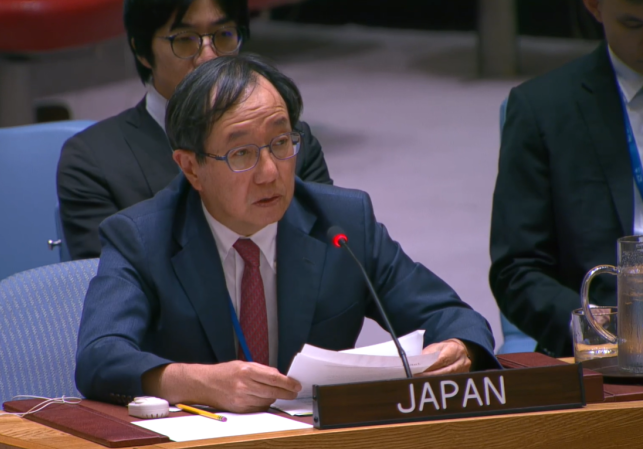「海洋安全保障:新興する課題への対処のための予防、イノベーション及び国際協力」に関する安保理ハイレベル公開討論における山﨑大使ステートメント
令和7年8月11日

(As delivered)
Thank you, Mr. President.
I wish to express Japan’s gratitude to Panama for taking the initiative to hold this timely meeting. I also thank the briefers for their meaningful inputs.
Since ancient times our region has been a place where civilizations blend through trade and cultural and religious exchange across oceans, and where people have cultivated a culture of openness, inclusiveness, and coexistence.
This history inspires us to continue working to maintain peace and stability at sea, and this is why Japan puts the greatest importance on the full respect for the rule of law at sea and the universal and unified character of UNCLOS, which plays a crucial role in setting out the legal framework that governs all activities in the oceans and seas.
Mr. President,
Today I would like to reiterate three points;
First, Japan proposed in 2016 a vision of a “Free and Open Indo-Pacific (FOIP),” which advocates for promotion of the rule of law, freedom of navigation, and commitment to peace and stability through capacity building among other pillars. The concept of FOIP underlines the rule of law at sea, which is all the more important today as unilateral attempts to change the status quo by force or coercion, or dangerous actions that obstruct the freedom of navigation and overflight, have increased.
Japan places great emphasis on the commitment to the peaceful settlement of disputes and strongly opposes any claims and actions inconsistent with international law, particularly UNCLOS. In that context, Japan recalls the significance of the Arbitral Tribunal’s award on the disputes between the Philippines and China regarding the South China Sea, which is final and legally binding on the parties.
Second, maritime law enforcement on tackling illicit activities, including piracy and IUU fishing, is another key area requiring our attention.
Japan has been assisting countries in need to build maritime law enforcement capacity, including through providing patrol vessels, supporting maritime transport infrastructure, enhancing maritime domain awareness, and dispatching Japan Coast Guard patrol vessels and aircraft, as well as experts, to combat illegal activities at sea.
Third, there have been a number of cases where UN sanctions are evaded at sea. Thus, there is an even greater necessity of sharing recognition of how UN sanctions should be implemented at sea and improving information-sharing to identify de-flagged vessels associated with sanctions evasions. In this regard, Japan has provided assistance worth 130,000 USD through UNODC to enhance the capacities of, and share information among, authorities of relevant Member States to address suspected UN sanctions evasion incidents. I commend the endeavours by flag states, including Panama, and Japan spares no efforts to enhance our cooperation with them.
In concluding, maritime security is fundamental to international peace and security. This agenda has been raised at multiple regional and international fora and the Security Council has discussed maritime security in various regions. We believe that the Council could play an essential role to enhance coordination and maritime governance and Japan is determined to closely work with the Council members and beyond to achieve a free and open maritime order anchored by the rule of law.
I thank you.
